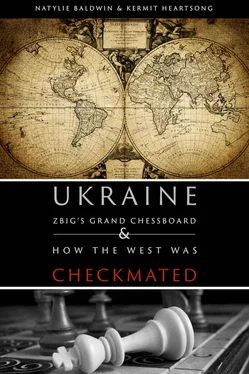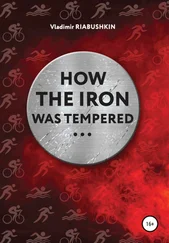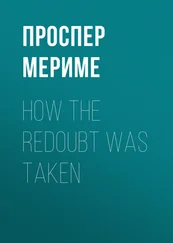Kermit Heartsong - Ukraine - ZBIG's Grand Chess Board & How The West Was Checkmated
Здесь есть возможность читать онлайн «Kermit Heartsong - Ukraine - ZBIG's Grand Chess Board & How The West Was Checkmated» весь текст электронной книги совершенно бесплатно (целиком полную версию без сокращений). В некоторых случаях можно слушать аудио, скачать через торрент в формате fb2 и присутствует краткое содержание. Год выпуска: 2015, Жанр: Политика, на английском языке. Описание произведения, (предисловие) а так же отзывы посетителей доступны на портале библиотеки ЛибКат.
- Название:Ukraine: ZBIG's Grand Chess Board & How The West Was Checkmated
- Автор:
- Жанр:
- Год:2015
- ISBN:нет данных
- Рейтинг книги:4 / 5. Голосов: 1
-
Избранное:Добавить в избранное
- Отзывы:
-
Ваша оценка:
- 80
- 1
- 2
- 3
- 4
- 5
Ukraine: ZBIG's Grand Chess Board & How The West Was Checkmated: краткое содержание, описание и аннотация
Предлагаем к чтению аннотацию, описание, краткое содержание или предисловие (зависит от того, что написал сам автор книги «Ukraine: ZBIG's Grand Chess Board & How The West Was Checkmated»). Если вы не нашли необходимую информацию о книге — напишите в комментариях, мы постараемся отыскать её.
Ukraine: ZBIG's Grand Chess Board & How The West Was Checkmated — читать онлайн бесплатно полную книгу (весь текст) целиком
Ниже представлен текст книги, разбитый по страницам. Система сохранения места последней прочитанной страницы, позволяет с удобством читать онлайн бесплатно книгу «Ukraine: ZBIG's Grand Chess Board & How The West Was Checkmated», без необходимости каждый раз заново искать на чём Вы остановились. Поставьте закладку, и сможете в любой момент перейти на страницу, на которой закончили чтение.
Интервал:
Закладка:
The Brzeziński calling card of goading Russia into a war or keeping it bogged down in one in order to weaken it has to be kept in mind in analyzing current events.
Flash forward to 2013 when the Ukraine crisis would erupt. With a negotiated end to the Cold War, a dissolved USSR, a Russian Federation that was firmly on the road toward an evolving version of capitalism, expanded economic ties with the EU, and cordial relations with Latin America and a lot of the developing world, Russia and most everyone else had moved on from the idea of Russia as big bad bogeyman. But not an assortment of Russophobes in Washington, like Brzeziński, and those they influence.
Brzeziński influenced both Kerry and Obama, having served as a foreign policy advisor, along with his son, Mark Brzeziński, to the 2004 Kerry presidential campaign and then for the Obama 2008 campaign. Although it is difficult to determine how often Brzeziński directly advises Obama, it is interesting to observe how hawks among both major political parties took their cue from Brzeziński when he compared Putin to Hitler in a March 3, 2014 op-ed for the Washington Post (Brzeziński 2014). Within two days, Hillary Clinton, John McCain and Marco Rubio all repeated this absurd claim (Ernesto 2014). It can, therefore, be deduced that Brzeziński still wields considerable influence among the Washington elite. As we will see later, US actions in Ukraine since the fall of 2013—the culmination of years of US covert operations in that country (Baldwin 2014) — are reminiscent of Brzeziński’s previous policies and actions.
Brzeziński continued to offer advice to the president publicly on the crisis via another op-ed, this one published by Politico.com on May 2, 2014, ,in which he essentially restated his view that America is exceptional and has the right and duty to pull Ukraine away from the Russian sphere of influence into the US-controlled Western sphere based on the premise outlined in his book: namely, that whoever rules Eurasia rules the world. This premise is based upon two assumptions: 1) that one country has the right to rule the world, and 2) that the US is noble or, at least benign, and must be the one to do that ruling lest some other empire crop up and do it. Or, as Terry Malloy said in On the Waterfront , “do it to him before he does it to you” (Brzeziński May 2014).
It is clear from the opening pages of The Grand Chessboard that Brzeziński is obsessed with imperialism and cannot conceive of a world that is not organized under empire — whether it is the competing regional empires of old or the rise of one global empire as reflected by the US after the Soviet Union’s exit from the world stage. He even repeats the common historical fallacy that “hegemony is as old as mankind.” If he had even a cursory familiarity with anthropology or pre-recorded history, he would know that throughout the vast majority of humanity’s experience, mankind lived in small, relatively egalitarian units of hunter-gatherers. Empire and its attendant effects, such as hegemony, hierarchical social structure, and war, only emerged around 10–13,000 years ago, roughly coinciding with the widespread adoption of agricultural settlement (Fry 2006).
Brzeziński's Eurasian thesis appears to have been inspired by Nicholas Spykman’s Eurasian Rimland concept, which was, in turn, built upon Halford Makinder's Heartland Theory, first formulated in 1904. Spykman’s Rimland emphasized the geostrategic importance of the densely populated coastal perimeter surrounding the Heartland of Eurasia. Spykman justified focus on the Rimland instead of the Heartland by arguing that the Rimland contained the majority of the world's people, a large swathe of its resources and an industrial base. Additionally, it served as an entryway to the seas, situated as a buffer zone between the Heartland (source of land power) and sea power. These two theories, like Brzeziński's Grand Chessboard, are widely acknowledged to represent an imperialistic offensive posture dressed up as a defense strategy (Nazemroaya 2012; Wikipedia. “Rimland”; Wikipedia — “Geographical”).
In The Grand Chessboard , Brzeziński reiterates the factors cited by Spykman and Makinder:
About 75 percent of the world's people live in Eurasia, and most of the world's physical wealth is there as well, both in its enterprises and underneath its soil. Eurasia accounts for about 60 percent of the world's GNP and about three-fourths of the world's known energy resources. (Brzeziński 1997)
He speaks throughout the book with a sense of entitlement on behalf of the US that the American empire should never cede control of these resources to those living near them who may strangely assume a claim to benefit from them.
He emphasizes the following two steps to achieve his imperialist objective of preserving world domination by the US:
1) Identify states in Eurasia that have the power to shift the international distribution of power or to be catalysts for doing so; and,
2) Formulate specific US policies to offset, co-opt and/or control the above as to preserve and promote vital US interests.
Brzeziński goes on to explain the role of Ukraine as a “pivot” state — in other words, a state that, if it remains under Russia's sphere of influence, allows Russia to project power into the rest of Eurasia due to its sea port, major resources, and its role as a geographic defensive buffer — an important psychological factor for a nation that has been invaded from the west numerous times in its history via Ukraine.
Hence, we have a Western-backed coup that toppled a democratically elected leader in Ukraine in order to install a government that would implement the European Association agreement — a stepping stone to NATO membership — and Russia’s counter move of reabsorbing Crimea to prevent its naval port from being diverted into potential control by NATO, a move that would have compromised Russia's security and status as an independent nation (An in-depth discussion of the coup itself follows in Part II of this book).
Provocations to get Russia to invade Ukraine — where it would no doubt face a major insurgency in the western part of the country, supported by US/NATO — are a throwback to Brzeziński’s plan to lure the Soviet Union into a quagmire in 1979 which contributed to that country's disintegration. It is an open secret that the Neocons and other Russophobes would consider the destabilization of Russia and a subsequent regime change ousting Putin to be the ultimate prize. Their dubious assumption is not only that this would be possible to do in the first place without risk of a nuclear war, but that any successor to Putin would be weak and compliant — another Yeltsin who will allow them unfettered access to Russia’s prodigious natural resources for exploitation — rather than a truly anti-Western hardliner that would be far less accommodating than Putin.
Interestingly, Brzeziński’s belief that whoever controls Eurasia controls the world does not necessarily rest on solid ground. As Matlock (2010) points out, history really only shows that whoever controls Eurasia controls Eurasia. Not that such control wouldn’t represent tremendous power and influence, especially economic, but there are other factors to consider in terms of world hegemony, such as control of the world’s seas, which Russia is not likely to attain any time soon even with firm control of Ukraine and a cemented alliance with China.
With this mindset and background, Brzeziński goes on numerous media outlets, gives speeches and testifies before Congress with his talking points about the Ukraine crisis, asserting who is responsible and how it started, with Russia as the instigator and Putin as the arch-villain described variously as Hitler, Stalin, a thug, and a Mafia gangster.
Читать дальшеИнтервал:
Закладка:
Похожие книги на «Ukraine: ZBIG's Grand Chess Board & How The West Was Checkmated»
Представляем Вашему вниманию похожие книги на «Ukraine: ZBIG's Grand Chess Board & How The West Was Checkmated» списком для выбора. Мы отобрали схожую по названию и смыслу литературу в надежде предоставить читателям больше вариантов отыскать новые, интересные, ещё непрочитанные произведения.
Обсуждение, отзывы о книге «Ukraine: ZBIG's Grand Chess Board & How The West Was Checkmated» и просто собственные мнения читателей. Оставьте ваши комментарии, напишите, что Вы думаете о произведении, его смысле или главных героях. Укажите что конкретно понравилось, а что нет, и почему Вы так считаете.











